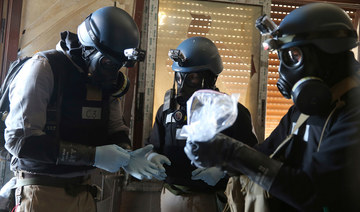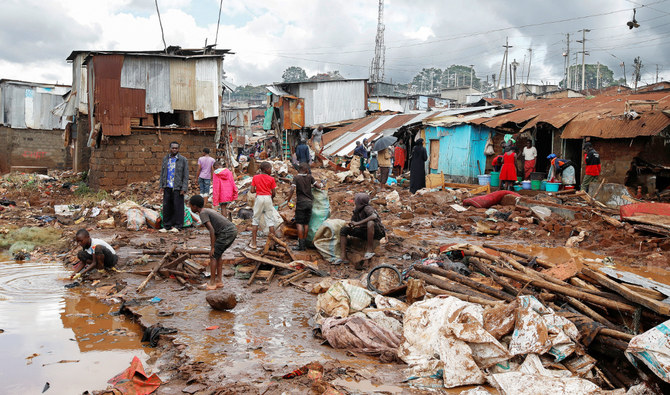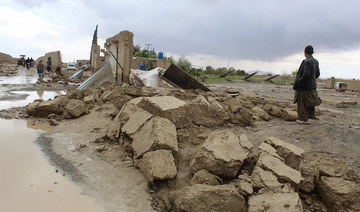NEW YORK CITY: The UK on Tuesday accused Syrian President Bashar Assad of restocking his regime’s arsenal of chemical weapons for at least the past five years.
Barbara Woodward, Britain’s permanent representative to the UN, told the Security Council that her country is “gravely concerned that the Assad regime has been working actively to rebuild its chemical weapons stockpile since at least 2018, in flagrant violation of its obligations (under) the Chemical Weapons Convention.”
Her allegation came during a meeting of the council to discuss the implementation of Resolution 2118. It followed a recent report by the Organization for the Prohibition of Chemical Weapons, the watchdog responsible for implementing the CWC, that concluded there is enough evidence to conclude that a chemical attack on the city of Douma in April 2018 was carried out by the Syrian Arab Air Force.
Resolution 2118 was unanimously adopted in September 2013 following a UN investigation that confirmed the use of chemical weapons against civilians during an attack in a suburb of Damascus.
It ordered the Syrian regime to destroy its stockpiles of chemical weapons by mid-2014, and set out punitive measures to be imposed in the event of non-compliance. It also banned Syria from using, developing, producing, acquiring, stockpiling or retaining chemical weapons, or transferring them to other states or non-state actors.
In October 2013, Syria submitted to the OPCW a formal initial declaration of its chemical weapons program, including a plan for destroying its stockpiles.
Fernando Arias, the director general of the OPCW on Tuesday briefed the council on the latest report by the organization’s Investigation and Identification Team. He said there were “reasonable grounds” to believe the Syrian Arab Air Force was responsible for the chemical attack on Douma five years ago.
The IIT, which is responsible for identifying the perpetrators of such attacks in Syria, concluded that on the evening of April 7, 2018, at least one helicopter belonging to the Syrian army’s elite Tiger Forces division dropped two yellow canisters filled with toxic chlorine gas onto two residential buildings in the city.
The attack resulted in the confirmed deaths of 43 named civilians. Some estimates put the true toll at 50. At least 100 people were injured.
Now that the world knows the facts, Arias added, it is up to the international community to take appropriate action.
The IIT said it reached its conclusions about the identity of the perpetrators on the basis of “reasonable grounds,” the standard of proof consistently adopted by international fact-finding bodies and commissions of inquiry.
According to the report, the third published by the team, investigators, analysts and several external independent experts scrutinized physical evidence collected from the scene of the attack, which included environmental and biomedical samples, witness statements and other verified data such as forensic analyses and satellite images.
“The IIT considered a range of possible scenarios and tested their validity against the evidence they gathered and analyzed to reach their conclusion: That the Syrian Arab Air Forces are the perpetrators of this attack,” the OPCW said.
Ambassador Bonnie Jenkins, the under secretary for arms control and international security at the US mission to the UN, also expressed concerns about Assad’s efforts to rebuild his regime’s chemical weapons program.
“It is not lost on us that many of the Syrian first responders now pulling civilians from the rubble (after Monday’s Earthquake in neighboring Turkiye) were, just a few years ago, helping civilians who had been burned or suffocated by the Assad regime’s chemical weapons,” she told the Security Council.
The IIT has now identified five separate instances of chemical weapons use it attributes to the Assad regime, Jenkins said. The latest report notes that Russian forces were stationed at the base from which the Assad regime helicopters launched the 2018 attack, she added, and jointly controlled the airspace over Douma with the Syrian Air Force.
“The United States and others have also long pointed out the extremely troubling role of the Russian forces in the aftermath of the attack, when Syrian and Russian military police denied and delayed OPCW inspectors access to the site,” Jenkins said.
“In an effort to set up their own staged investigations, they also attempted to sanitize the site and remove incriminating evidence of (chemical weapons) use.”
She added that the OPCW report “puts to rest Russia and Syria’s baseless allegations that opposition forces were to blame for the Douma attack. The IIT made clear that it found such a fable lacked any shred of credibility.”
In common with the majority of council members, Jenkins called for the perpetrators of the attack to be held accountable, and for the Assad regime to comply with its international obligations and provide OPCW staff with “immediate and unfettered” access so that they can continue their investigations.
However, Russia’s permanent representative to the UN repeated his country’s claim that the IIT report is a “hoax.” Vassily Nebenzia also again alleged that the work of OPCW and IIT is biased and politicized.
He described the Douma incident as a “staged chemical weapons attack” and a “brash falsification by the West.”




